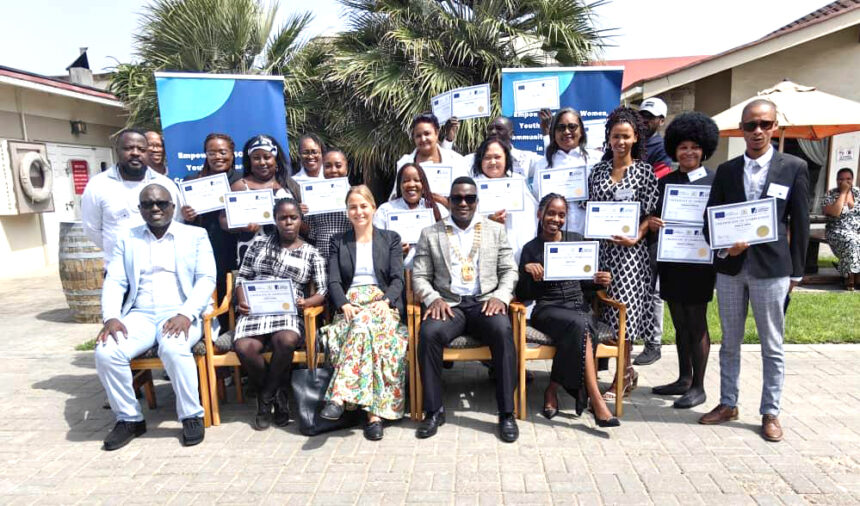The Empowering Civil Society Organisations (CSOs), Women, Youth and Marginalised Communities as Equal Partners in Democracy (ECSO) celebrated the accomplishments of its 55 participants.
The project is funded by the European Union (EU).
These individuals successfully completed three essential training modules: Operational and Administration Management, Financial Literacy as well as Youth Engagement and Empowerment.
The celebration took place in March in Swakopmund, where a total of 174 certificates were presented. Brigitte Ursula Horases, a beneficiary from the Kunene region, expressed sincere gratitude to the EU- Konrad-Adenauer-Stiftung (KAS) Project for empowering community leaders in her area.
“I am optimistic that the skills we acquired will help strengthen our CSOs, and benefit our members in ways we have yet to see,” she said.
Hendrina Josephine Rooi, a participant from the //Kharas region, shared positive feedback.
She described the training as “extremely helpful”.
Rooi said the training provided valuable insights and practical knowledge applicable to both her professional and personal life.
She specifically noted module 4, which focused on youth engagement and empowerment, as eye-opening.
“It was a revelation for me. I am grateful to (KAS) for their commitment to positively impacting the lives of the beneficiaries,” she stated.
Swakopmund mayor Blasius !Goraseb highlighted the significant role of CSOs in the democratic process.
He urged them to recognise their influence in advocating for change and promoting inclusivity and democracy.
“This project demonstrates the strength of collective action, and embodies the belief that everyone, regardless of gender, age or background, plays a critical role in shaping our democratic society. Civil society organisations, along with women, youth and marginalised groups, form the backbone of a flourishing democracy. Their input must be acknowledged, valued and integrated into the decision-making processes that affect our future,” he remarked.
Silke Hofs, EU cooperation attaché, emphasised the EU’s commitment to strengthening civil society.
“An empowered civil society that actively engages in governance fosters meaningful change and serves as a foundational pillar of democracy in Namibia,” she shared. “This project equips CSOs with essential skills, such as financial literacy, advocacy and policy engagement. Stronger CSOs lead to stronger communities, which in turn lead to a stronger Namibia,” Hofs added.
From the perspective of the project implementers, Anna Hoffmann-Kwanga, KAS country resident representative and project director, highlighted the project’s significance, stating that a vibrant and articulate civil society is crucial for any inclusive and participatory democracy.
“We proudly celebrate the halfway mark of our project with the EU and Women’s Action for Development, equipping CSOs in Erongo, Kunene and //Kharas with the skills, knowledge and networks necessary for effective political engagement and advocacy for the rights of women, youth and marginalised groups,” she noted.
Hoffmann-Kwanga said this initiative not only aims to amplify voices, but also ensure these voices contribute to tangible changes in policy and governance.
-pmukokobi@nepc.com.na



